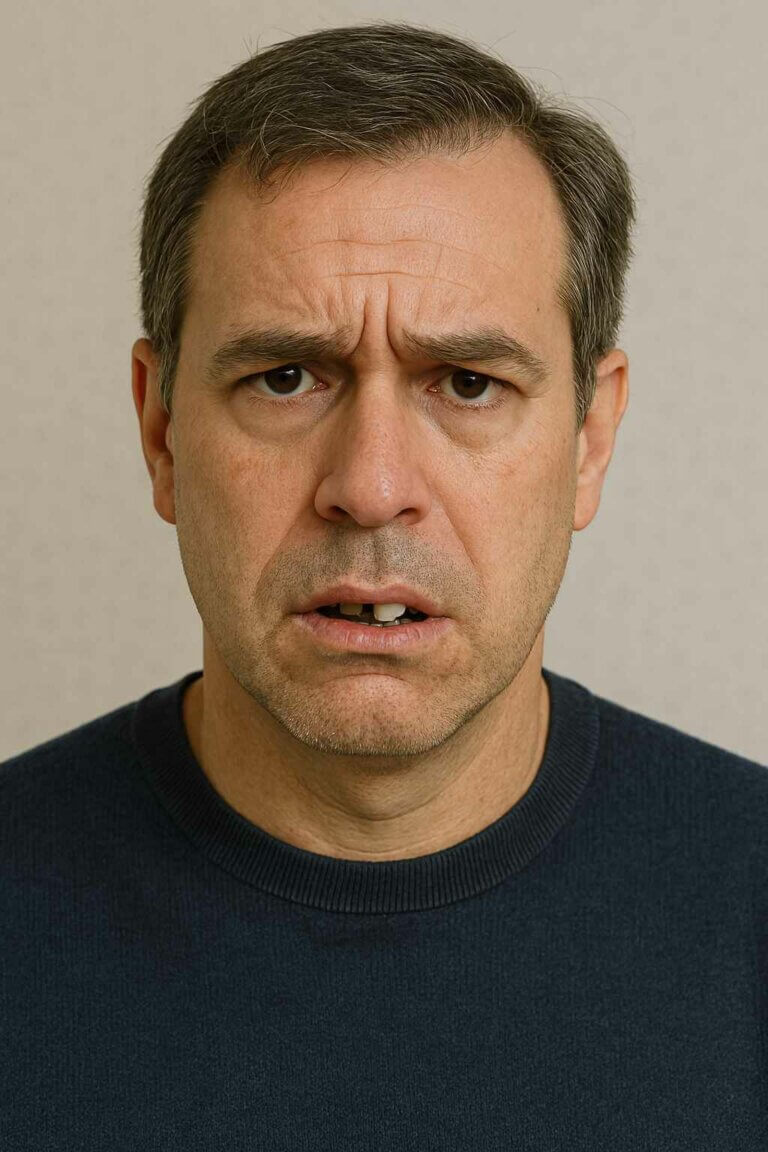When your front tooth chips repeatedly despite multiple repairs, it’s not just frustrating—it’s a sign of a deeper dental issue that needs addressing.
As an experienced dentist, I’ve seen numerous patients who come to me after multiple failed repairs, hoping for a quick fix to restore their smile.
However, the real solution requires understanding and addressing the root cause – not temporary quick fixes.
Why Does My Front Tooth Keep Chipping?
There is an old saying that “the definition of insanity is doing the same thing over and over and expecting different results.” It is often attributed to Albert Einstein. I heard it quoted many years ago in the 1997 action movie Con Air. It was said by a convict who was portrayed as mentally unstable.
Whoever said it first is irrelevant, as the message it conveys is true. Unless you can find a specific reason for a failed action, then why do it a second time? It will fail like it did the first time.
A Cycle of Repairs That Don’t Last
I see this approach and request to repeat failed procedures often in my practice. A patient will come to me from another practice, showing me the results of a procedure that did not yield the anticipated outcome.
Often, the tooth in question is a front tooth, and the failed procedure results in a fracture. When it comes to our front teeth, we often strive for the least invasive and simplest procedure.
There is nothing wrong with that approach. In fact, I strive to follow that path as often as I can. I have said before that the best dentistry is often the least dentistry. I have also stated that if you want your front teeth to last for a lifetime, back-functioning teeth are essential to this goal.
Why Front Teeth Are Breaking Down
My first patient this morning paged me over the weekend with a concern over a broken tooth.
As soon as I saw his name, I knew which tooth was the subject of his statement.
He came to me a little while ago with a request that I repair a broken tooth again with a conservative approach. The tooth in question was his upper left front tooth.
When I saw him then, I told him that once a simple bonded dental filling breaks, the source of the problem should be found. While dental bonding is a fast and conservative option, it’s not always the most durable solution—especially for high-stress areas like front teeth.
In the absence of that discovery, the procedure will be unsuccessful again.
The Problem with Repeating the Same Quick Fixes
My pleas fell on deaf ears as doing anything more than a minimal procedure was not in the cards for this gentleman.
Despite my recommendations, he insisted that I not do anything more extensive. Since the technique did not even involve anesthesia and no harm could come to the tooth, I acquiesced. Had I needed anesthesia or if the possible result would be deleterious to the tooth or the patient, I would not have agreed.
I knew what was going to happen and yet he needed a real demonstration to prove it.
How was I so sure that the bonded tooth would break again? It was based on the areas of wear on the adjacent teeth as well as the lower teeth. He was missing many of his back teeth, and all of his chewing was being done with his remaining front teeth.
What’s the Long-Term Solution?
Now, you all know what I am going to say. Front teeth were not designed to chew.
Incisors (front teeth) are primarily meant for cutting, not grinding or chewing, which is the role of molars and premolars.When they are forced to chew, the result is excessive wear, chipping, and fracture of many front teeth.
This is what occurred, and my patient was desperate to smile without an unsightly break.
To fix his tooth, a sturdier fix was needed.
However, only by replacing the back teeth and correcting some of the excessive pressure on the front teeth can I create a lasting smile. Sometimes, when I suggest that to a patient, they may think that I have lost my way, but now we know what the definition of insanity is.
Final Thoughts: Don’t Settle for Temporary Quick Fixes
Don’t do the same thing repeatedly. Simply put, it won’t work. If you have a procedure that is done multiple times, please call us to give it a fresh look. We can be reached at 440.951.7856.
I look forward to meeting you.
Jeffrey Gross, DDS, FAGD, is a highly qualified and experienced general dentist licensed in Ohio. He is also a respected Case Western Reserve School of Dental Medicine staff member.

